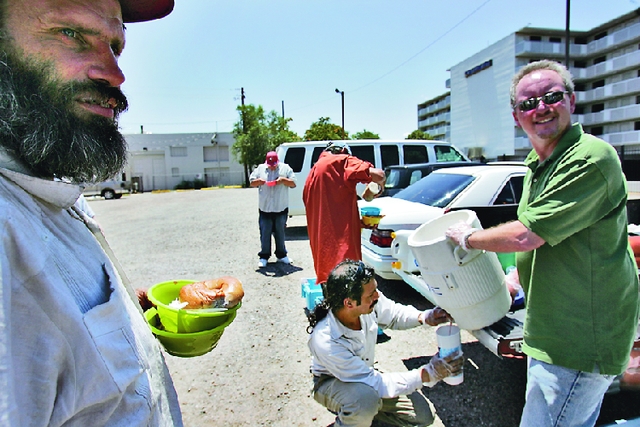For almost 120 Sundays, about two years, Catholic organization Trinity House has served up hot lunches to the homeless. On July 1, after a handful of warnings, police officers told volunteers not to get out of their cars when they pulled up to their usual spot, according to a Trinity House news release."We don’t want to have to risk arrest to continue serving our brothers and sisters," worker Chelsea Collonge says in the release. Trinity House serves its free food in Robinson Park, a grassy area Downtown bordered with hotels, houses and apartments. The park is known for its high concentration of homeless people—but also for hosting an assortment of drug dealers, addicts and prostitutes. Detective Elizabeth Thomson is assigned to the Downtown Strategic Outreach team, a collaboration of service providers and the Albuquerque Police Department that connects homeless people with social services. Thomson says the police department heard lots of complaints about the Sunday gathering from Robinson Park’s business and residential neighbors. The link between Sunday free lunches and crime exists, she says. "But let me put it to you this way: It’s not because they’re providing meals. It’s because there’s a large gathering of people, and it is completely unsupervised by authority."Whenever there is a large group, especially one containing vulnerable individuals, there is an opportunity for predators, Thomson says. Almost every single Sunday there’s a fight, she says. Homeless people show up for food and get their backpacks stolen, she adds. "The drug dealers, they’re businesspeople. They know a good condition for buying and selling illegals drugs." A regular gathering of vulnerable people is perfect. "Some of the homeless are buying drugs. It would be ignorant to say that’s not the case." Sundays are hard days Downtown overall. Services, programs, Social Security are closed. There’s little to do, and there are fewer officers around.Downtown resident Nathan Fox wrote to the Alibi in October 2006 complaining of the Trinity House’s Sunday food distribution. "I will not spare you the harsh reality that this group, and other groups like it, willingly put the safety of our families at risk with their actions," he wrote.
Trinity House worker Marcus Page doesn’t see it that way. "We still have this wonderful oasis, this pocket of peace, going on for one hour every Sunday from 1 to 2 [p.m.]," he says. "Because they’re doing their crimes in such close proximity and timing to when we’re serving the meals, people want to find some way to stop it by pegging us, scapegoating us as somehow causing it or tacitly approving of it." He says there is no connection between the people coming to get free food and the criminals. He blames the association on years of the media linking homelessness and criminality in reports.
Thomson, Page says, was an ally of Trinity House. The legal authority for the police asking his group to leave Robinson is based on permitting. Anyone who provides food to the public in the city has to have a permit. That permit has to be signed off by every group impacted by the event. In this case, Trinity needs to get the rubber stamp from the Environmental Health Department, the neighborhood and the police.
To obtain the proper food service permit Trinity House would have to come up with a commercial kitchen, though Page says Trinity has learned to follow health code standards even if it doesn’t have a commercial grade stove, sink and refrigerator. Trinity hopes to get the permit together over the next month or so.
In the meantime, Trinity will continue to show up on Sundays, though volunteers will serve lunch in the privately owned parking lot across from the park in the hope that this will offer the group some protection from police interference. Detective Thomson suggested Trinity rotate parks in an effort to mitigate the effect food distribution is having on the neighborhood. Page says regularity and reliability helps people seeking food, and he’s not willing to do anything to compromise the potency of his endeavor. "It’s not our job to fight crime. It’s our job to feed people. If we can help prevent crime, we’re all for that," he says. "Food in the belly brings about more happiness and therefore oftentimes that enables people to be more empowered and not as desperate."
So why doesn’t APD just send some extra officers out to the park on Sunday during food-distribution hours? "Our manning levels are low, and on Sundays in particular, it would be expensive to bring in officers," says Thomson. Although she’s usually out with the Strategic Outreach Team on Sundays, her job is to work with homeless people, she says, not to provide security for this particular event. On bad days, it’s hard for her to get out of the park and work with homeless people in other parts of Downtown. It’s been a particularly bad summer for drugs, she adds. "Our narcotics division has been overwhelmed working Downtown," she says. "People are quick to say, ‘It’s criminal activity. The police should just solve it.’ We are a community, and we solve and prevent crime by being a community and all being involved."
Thomson says she’s not going to look for Trinity House on Sundays or lay in wait to bust the volunteers if they don’t have a permit. That’s not her job. A police officer can ask them to stop serving on city or private property and can order them to leave city property, she says. But Robinson Park is just a small drop in a large police district.
Page, however, feels persecuted by APD and has developed a strategy for getting the job done. There are people in his organization willing to risk arrest to serve the homeless food, he says. "In our mind, it’s a crime to prevent people from eating, so the cops are guilty of a crime."



